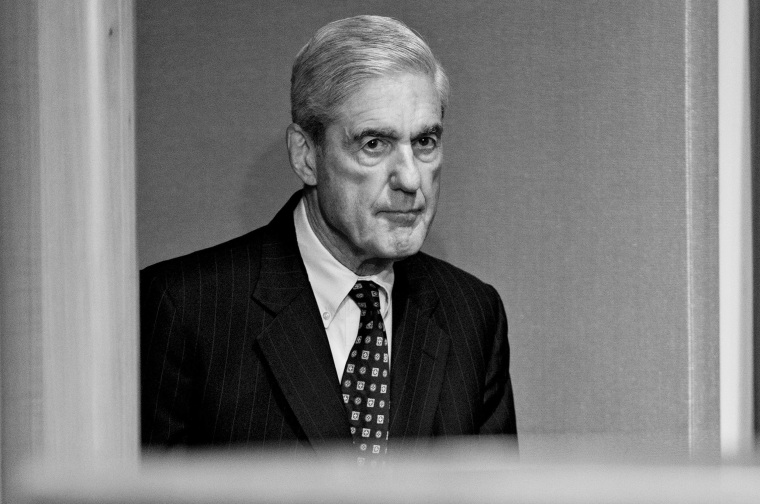Former special counsel Robert Mueller is finally scheduled to testify before Congress on July 17. According to President Donald Trump’s attorney Jay Sekulow, the administration expects “that his testimony will be his report.” And, Rudy Giuliani, another of the president’s lawyers, downplayed its significance even further, stating “Who cares?”
Donald Trump, for one, seems to care quite a lot. He also seems concerned — as he should be. Why? Mueller isn’t likely to reveal some previously unknown bombshell about an interaction between Trump and the Russians. It’s also unlikely that Mueller is going to tell us much more about the redacted portions of his report. Mueller has repeatedly insisted that he will only testify about what is actually in the report. And there are plenty of legitimate reasons why he would decline to reveal information about ongoing investigations. Thus, people who have thoroughly read Mueller’s report may not learn anything new from his testimony — and should temper their expectations accordingly.
Want more articles like this? Sign up for the THINK newsletter to get updates on the week's most important political analysis
But, Mueller’s testimony remains important for one very simple reason: The facts and evidence that he has already unearthed and laid out in his nearly 400-page report paint an incredibly damning picture of the Trump campaign and, indeed, the president himself. Mueller’s report details the unethical cooperation with a foreign power attempted by Trump’s campaign and the criminal obstruction efforts of Trump. And those who read the report should, if truly evaluating the facts fairly and clearly, come to the conclusion that Trump is unfit to remain president.
In other words, there is value in Congress illuminating through Mueller these already-known facts — particularly because Attorney General William Barr intervened with his own misleading summary of the report before it was released. Barr's actions facilitated the false narrative of “no collusion” and “no obstruction” that persists to this day. Focusing the public on some of the most significant conduct outlined in the report should help America better understand the extent of Trump’s corruption and obstruction
One example illustrates this. In May, the special counsel’s office filed a letter in the case of Trump’s former national security advisor turned federal cooperator Michael Flynn. That letter, amongst other things, highlighted that people connected to Trump had reached out to Flynn’s lawyer to try to dissuade Flynn from cooperating with the federal investigation.
This revelation, of course, sparked a flurry of media coverage. This coverage intensified following new information about an audio recording from John Dowd, one of Trump’s previous lawyers, to Flynn’s lawyer, that detailed how Dowd had tried to discourage Flynn from cooperating. The transcript of the voicemail felt like the script of a mafia movie.
Here’s the part that should worry Trump and his allies — the information about the efforts of Dowd and others are in the Mueller report.
But — and here’s the part that should worry Trump and his allies — the information about the efforts of Dowd and others is in the Mueller report. That evidence, including Dowd’s bombshell voicemail message has been publicly available since the report’s release back in April. Indeed, a partial transcript of Dowd’s message is on page 121 of volume II. And Mueller explicitly stated in the report that “the President sent private and public messages to Flynn encouraging him to stay strong and conveying that the President still cared about him before he began to cooperate.” He concluded that the conduct had the potential to influence Flynn’s decision and extent of cooperation.
So, why was there so much interest in these same facts in May of 2019, several weeks later? First, the information made a splash because Barr and Trump have so successfully misrepresented what Mueller actually found. I believe a careful reading of the report makes perfectly clear that there was an abundance of conduct between the Trump campaign and Russia that constitutes “collusion” (Mueller just didn’t call it that) and that Trump engaged in many instances of blatantly obstructive conduct.
Second, the report contains such an overwhelming amount of incriminating information that it is easy to lose sight of how shocking the conduct is until it is examined in isolation.
Mueller’s testimony has the potential to help Americans understand that Mueller found “numerous links between the Russian government and the Trump campaign.” And Mueller also found that Trump engaged in obstruction of justice by repeatedly trying to dissuade witnesses from cooperating or testifying, using threats and intimidation when they did cooperate, encouraging witnesses such as Don McGahn and deputy national security adviser K.T. McFarland to lie and/or misrepresent facts, refusing himself to be questioned under oath — and giving misleading and incomplete written answers when he did respond to Mueller’s questions.
Democrats out for blood need to understand that Robert Mueller isn’t going to argue for impeachment, or anything close to that. But the president’s conduct, as documented in the report, should make the case for Trump's removal. Americans have to reach their own conclusions about whether impeachment is warranted, but they can’t do that without a proper understanding of the facts. Mueller’s public testimony is an important part of that process.

